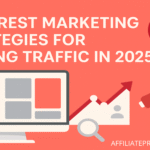Welcome to my article “The Future of Affiliate Marketing: Predictions for the Next 5 Years”.
Affiliate marketing has come a long way from its early days of banner ads and overly enthusiastic product reviews. What once felt like a side hustle for bloggers has evolved into a multi-billion-dollar industry driving global e-commerce. But as digital trends shift faster than you can say “algorithm update,” one thing is certain: staying ahead of the curve in affiliate marketing isn’t just a nice-to-have—it’s survival.
In this article, we will put on our fortune-telling hats—ethically sourced and cookie-free, of course—and explore five major trends that will shape the future of affiliate marketing. Whether you’re a seasoned pro or just dipping your toes into the affiliate pool, these predictions will help you prepare for what’s coming next. And who knows? With a little foresight and strategy, you might just future-proof your business and be the one laughing all the way to the (crypto) bank. Let’s dive in!
My Best Recommended & Proven Way to Make $100-$300 Daily – Watch This FREE Video to START >>>

AI and Automation in Affiliate Marketing
If affiliate marketing were a blockbuster movie, AI and automation would be the unexpected breakout stars—think less “supporting character” and more “main protagonist who saves the day.” Over the past few years, these technologies have turned what was once a manual, time-consuming process into a sleek, efficient operation that practically runs itself. Okay, maybe not entirely on its own—but close enough to make marketers breathe a little easier.
Let’s start with AI, the clever kid in class who knows what you want before you do. AI algorithms analyze user behavior with Sherlock Holmes-level precision, predicting which products someone is most likely to buy and serving them up at just the right moment. Think personalized ads, tailored email campaigns, and even chatbots that can answer customer questions with uncanny accuracy. (Although, let’s be honest, some chatbots still need a little fine-tuning—nobody likes being called “human #458”.)
Then there’s automation, the workhorse of the affiliate world. Gone are the days of manually tracking clicks, generating affiliate links, or piecing together conversion data from five different platforms. Today’s tools do it all for you. Automation software can manage your campaigns, monitor performance in real-time, and even send you alerts when something needs your attention. It’s like having a 24/7 assistant—minus the coffee runs.
But it’s not just about convenience. AI and automation are leveling the playing field for affiliates. Small-time bloggers and niche creators can now compete with bigger players by leveraging these tools to maximize their reach and efficiency. And as these technologies evolve, we’re likely to see even more impressive innovations: AI-generated content tailored for SEO, automated influencer partnerships, and predictive analytics that help you stay one step ahead of trends.
Of course, all this tech wizardry comes with a caveat. Relying too heavily on automation can make your campaigns feel robotic, and audiences can spot insincerity from a mile away. The trick is to balance the efficiency of AI with the human touch that builds trust and connection. Done right, AI and automation aren’t just tools—they’re your secret weapons for thriving in the fast-paced world of affiliate marketing.
The Rise of Voice Search and Affiliate Marketing
“Hey Alexa, how can I make my affiliate marketing strategy future-proof?” If your affiliate marketing plans don’t involve voice search yet, it’s time to join the conversation—literally. Voice search is rapidly transforming how people find information and shop online, and it’s not slowing down. With billions of smart speakers, virtual assistants, and voice-enabled devices in homes worldwide, talking to our tech is becoming as natural as scrolling on our phones (and way more convenient when your hands are full of snacks).
Here’s the thing: voice search doesn’t play by the same rules as traditional text-based queries. When people type “best coffee makers,” they’re happy to scroll through a dozen results. But when they ask Siri, they’re looking for one concise, spot-on answer. This shift means affiliate marketers need to optimize for what’s called “position zero”—the coveted spot where voice assistants pull their answers. If your content isn’t hitting that sweet spot, you’re missing out on a growing audience of hands-free shoppers.
My Best Recommended & Proven Way to Make $100-$300 Daily – Watch This FREE Video to START >>>
And speaking of shopping, voice search isn’t just about finding information; it’s about making purchases. Whether it’s reordering household items or impulse-buying that viral gadget they heard about on TikTok, consumers are using voice commands to shop faster and more conveniently than ever. For affiliate marketers, this opens up new opportunities to tailor content around voice-friendly keywords, conversational search phrases, and questions like, “What’s the best budget laptop under $500?”
But here’s the catch: optimizing for voice search requires a different mindset. It’s less about stuffing your content with keywords and more about crafting natural, question-and-answer-style content that aligns with how people actually speak. Think FAQs, long-tail keywords, and a conversational tone that makes your content sound less like a robot and more like a helpful friend.
As voice technology continues to evolve, it’s not hard to imagine voice-enabled affiliate marketing platforms becoming the norm. Picture this: users asking Alexa for product recommendations and instantly being directed to your affiliate link. It’s futuristic, sure, but entirely plausible—and a good reason to start positioning your content for voice search dominance today. Who knows? You might just become the go-to affiliate marketer for every voice assistant in the business.
Expansion of Micro-Influencers and Niche Affiliates
Once upon a time, affiliate marketing was dominated by big names and mass-market approaches. If you weren’t a household name or didn’t have a million followers, good luck competing for commissions. But then, like the underdog hero in a feel-good movie, micro-influencers and niche affiliates rose to the occasion—and they’re here to stay.
Micro-influencers, with their smaller but highly engaged audiences, have flipped the script on affiliate marketing. These are the creators who might not have millions of followers but do have a loyal fanbase that hangs on their every word. Their secret? Authenticity. When a micro-influencer recommends a product, their audience feels like it’s coming from a trusted friend, not a walking advertisement. And as more consumers grow weary of overly polished, corporate-sounding content, this personal touch is becoming a marketer’s golden ticket.
Then there are niche affiliates, the specialists who carve out corners of the internet for everything from organic dog food to eco-friendly tech gadgets. These affiliates excel at serving hyper-targeted content to audiences who are really into a specific topic. By catering to these passionate communities, niche affiliates can drive higher conversion rates than their broader-focused counterparts. After all, someone searching for “vegan hiking boots for wide feet” is already primed to buy—they just need the right affiliate to point them in the right direction.
What’s fueling this trend? For starters, the explosion of social media platforms like TikTok, Instagram, and YouTube has made it easier for micro-influencers and niche creators to find and connect with their audiences. And with the growing demand for tailored, relatable content, brands are increasingly partnering with these smaller-scale creators for affiliate campaigns. Why? Because it works. Micro-influencers deliver a better ROI by focusing on quality over quantity, and niche affiliates tap into markets that larger players often overlook.
The takeaway here? In the world of affiliate marketing, “smaller” doesn’t mean “less effective.” Micro-influencers and niche affiliates are proving that sometimes, it’s the little guys who make the biggest impact. So, if you’re looking to grow your affiliate business, it’s time to think small—and reap the big rewards.
Changing Regulations and Privacy Concerns
If there’s one thing affiliate marketers have learned, it’s this: the digital landscape is like a party where the rules keep changing. Just when you think you’ve mastered the game, a new set of regulations or privacy updates shows up like an uninvited guest, ready to shake things up. From cookie-crunching laws to privacy-conscious consumers, the affiliate marketing world is navigating some tricky terrain.
First up, let’s talk about data privacy laws. Acronyms like GDPR (General Data Protection Regulation) and CCPA (California Consumer Privacy Act) might sound boring, but they pack a punch. These regulations are designed to give consumers more control over their personal data, which is great for them but often leaves marketers scrambling. Tracking cookies—once the bread and butter of affiliate campaigns—are being phased out faster than floppy disks. Google, for instance, has promised to bid farewell to third-party cookies, leaving marketers wondering how they’ll track conversions without feeling like they’ve lost their compass.
My Best Recommended & Proven Way to Make $100-$300 Daily – Watch This FREE Video to START >>>
But don’t panic yet. The affiliate marketing world is adapting. Server-side tracking, first-party data collection, and privacy-friendly analytics tools are stepping up to fill the void. While these solutions might require a bit more effort to implement, they also promise a more transparent, ethical approach to marketing. Plus, they help build trust with consumers—a valuable currency in today’s skeptical world.
Then there’s the growing emphasis on disclosure and transparency. Remember when you could sneak in an affiliate link without saying a word? Those days are long gone. Regulators like the FTC (Federal Trade Commission) are cracking down on vague or hidden disclosures, and platforms like Instagram and YouTube are enforcing stricter guidelines for creators. “#ad” isn’t just a suggestion anymore—it’s a must.
The bottom line? The affiliate marketing future belongs to those who can adapt to these changes. By embracing privacy-first strategies, staying compliant with regulations, and being upfront with your audience, you won’t just survive—you’ll thrive. And who knows? Maybe in this new, transparent world, you’ll earn more than just commissions; you’ll earn trust, too.
The Role of Web3 and Decentralized Platforms
Welcome to Web3, the new frontier of the internet where centralization is so last season, and decentralization is the new buzzword in town. If Web2 was all about social media giants and mega-platforms calling the shots, Web3 flips the script by putting power (and data) back in the hands of users. For affiliate marketers, this brave new world isn’t just a trend—it’s an opportunity to rethink the way we connect, promote, and earn commissions.
At the heart of Web3 is blockchain technology, which promises a level of transparency and security that would make even the most skeptical marketer breathe easier. Unlike traditional affiliate systems that rely on middlemen, decentralized platforms use blockchain to track clicks, sales, and payouts. This means fewer disputes, faster payments, and no shady “lost” commissions because, let’s face it, nobody misses waiting three months to get paid for a sale you drove.
But the real game-changer? Smart contracts. These nifty bits of code automatically execute agreements when certain conditions are met. Imagine an affiliate agreement where your commission is instantly sent to your wallet the moment a sale is confirmed—no manual approval, no third-party delays, just instant gratification. And let’s not forget the added bonus: the potential to earn in cryptocurrencies, giving affiliates access to a global market without worrying about exchange rates or bank fees.
Then there’s the metaverse, the virtual playground where digital worlds and economies are thriving. Picture this: promoting affiliate products in a virtual storefront, hosting immersive product demos, or even offering exclusive NFT (non-fungible token) perks to buyers. As more brands dive into the metaverse, affiliates who establish themselves early could be cashing in on a whole new dimension of marketing.
Of course, Web3 isn’t without its challenges. The learning curve can feel steeper than climbing Everest, and the tech itself is still evolving. Plus, crypto markets can be as volatile as your average toddler’s mood. But for those willing to adapt, the potential is enormous.
Web3 and decentralized platforms might still be in their early days, but their impact on affiliate marketing is undeniable. From streamlined payouts to new ways to engage audiences in virtual spaces, this is a shift you don’t want to sleep on. So strap in, grab your digital wallet, and get ready to explore the future—because the Web3 wave is coming, and it’s bringing a whole new set of opportunities for affiliate marketers.
Conclusion
Well, there you have it: a whirlwind tour through the exciting, unpredictable, and often perplexing future of affiliate marketing. From AI-powered tools that practically think for you, to the rise of micro-influencers and decentralized platforms, it’s clear that the affiliate landscape is evolving faster than you can say “click-through rate.”
But here’s the good news: while the future may be filled with shiny new technologies and changing regulations, the core of affiliate marketing remains the same—creating value, building trust, and helping people find the products they need. If you can stay flexible, embrace innovation, and keep your audience’s needs at the heart of your strategy, you’ll be well-equipped to thrive in this ever-changing landscape.
Of course, it won’t be all smooth sailing. As we’ve discussed, the road ahead may be bumpy with new privacy laws, voice search optimization, and the looming challenge of keeping up with cutting-edge tech. But that’s also what makes affiliate marketing so thrilling. Every challenge presents an opportunity for those willing to roll up their sleeves, learn, and adapt.
So, whether you’re a seasoned affiliate marketer or just starting out, the key takeaway is simple: the future of affiliate marketing isn’t just something to watch—it’s something you can shape. Stay ahead of trends, experiment with new strategies, and don’t be afraid to dive into new frontiers like Web3 and voice search. The opportunities are limitless, and the more you prepare now, the better positioned you’ll be to take advantage of the next wave of affiliate marketing innovation.
My Best Recommended & Proven Way to Make $100-$300 Daily – Watch This FREE Video to START >>>
Now go ahead—dust off that crystal ball, grab your marketing toolkit, and get ready to dominate the future. It’s going to be one heck of a ride, and we can’t wait to see where it takes you!
Thank you for reading my article “The Future of Affiliate Marketing: Predictions for the Next 5 Years” till the end. Hope it helped you. See you with another article.










